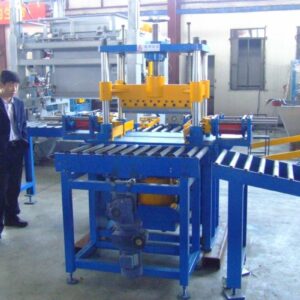How efficient is a block making machine in terms of production rate?
The efficiency of a block making machine in terms of production rate can vary depending on several factors, including the type of machine, its capacity, the size and complexity of the blocks being produced, and the operating conditions.
Here are some key factors that influence the production rate and efficiency of block making machines:
- Machine Type: There are various types of block making machines, including manual, semi-automatic, and fully automatic machines. Fully automatic machines generally have higher production rates compared to manual or semi-automatic machines due to their automated processes.
- Capacity: The capacity of a block making machine refers to the number of blocks it can produce in a given time period, typically measured in blocks per hour (BPH) or blocks per day. Machines with higher capacities can produce more blocks in the same amount of time, thus increasing production rates.
- Block Size and Complexity: The size, shape, and complexity of the blocks being produced can impact production rates. Producing larger or more intricate blocks may require additional time and resources compared to standard-sized blocks.
- Cycle Time: The cycle time of the machine, which includes the time required for molding, curing, and demolding the blocks, directly affects production rates. Machines with shorter cycle times can produce blocks more quickly, block making machine for sale in usa leading to higher efficiency.
- Operator Skill and Experience: The skill and experience of the machine operator can also influence production rates. A well-trained and experienced operator can optimize machine settings, troubleshoot issues quickly, and maintain consistent production flow, leading to higher efficiency.
- Maintenance and Downtime: Regular maintenance and minimal downtime are crucial for maintaining high production rates. Machines that require frequent maintenance or experience frequent breakdowns may have lower overall efficiency due to interruptions in production.
- Raw Material Quality and Availability: The quality and availability of raw materials, such as cement, aggregates, and additives, can impact production rates. Adequate supply of quality materials is essential for uninterrupted operation and consistent block quality.
- Automation and Control Systems: Fully automatic block making machines often incorporate advanced automation and control systems, which can optimize production processes, minimize human error, and increase efficiency compared to manual or semi-automatic machines.
Overall, the efficiency of a block making machine in terms of production rate depends on a combination of these factors. Manufacturers and operators should consider these factors carefully when selecting, operating, and maintaining block making machines to maximize productivity and efficiency in block production.
How does the maintenance schedule for block making machines look like?
The maintenance schedule for block making machines typically involves regular inspection, cleaning, lubrication, and repair tasks to ensure optimal performance, prevent breakdowns, and prolong the machine’s lifespan. While specific maintenance requirements may vary depending on the type and model of the machine, as well as the manufacturer’s recommendations
Here is a general outline of a maintenance schedule for block making machines:
- Daily Maintenance:
- Check all moving parts and components for signs of wear or damage, such as belts, chains, bearings, and hydraulic components.
- Clean the machine thoroughly, removing any debris, concrete block maker dust, or buildup from the surfaces, molds, and conveyor systems.
- Lubricate moving parts and components as needed, following the manufacturer’s recommendations for the type and quantity of lubricant to use.
- Check hydraulic fluid levels and top up if necessary.
- Verify that safety features and emergency stop mechanisms are functioning correctly.
- Weekly Maintenance:
- Inspect electrical wiring and connections for signs of damage or loose connections, and tighten or repair as needed.
- Check and adjust tension on belts and chains, ensuring proper alignment and tension for smooth operation.
- Test the machine’s controls and sensors to ensure proper functioning.
- Inspect molds and replace or repair any damaged or worn-out mold components.
- Monthly Maintenance:
- Perform a more detailed inspection of hydraulic systems, including hoses, pumps, valves, and cylinders, checking for leaks, wear, or damage.
- Clean and inspect air filters, fuel filters, and oil filters, replacing them if necessary.
- Check for any abnormal vibrations, noises, or other signs of mechanical problems, and investigate and address any issues promptly.
- Grease or lubricate all bearings, shafts, and other moving parts as recommended by the manufacturer.
- Quarterly Maintenance:
- Conduct a thorough inspection of the machine’s structural components, including frames, supports, and welds, checking for cracks, corrosion, or other structural issues.
- Test and calibrate the machine’s sensors, gauges, and control systems to ensure accuracy and reliability.
- Inspect and clean the electrical panels, block maker machine switches, and contactors, checking for signs of overheating or damage.
- Perform any necessary adjustments or alignments to ensure proper operation and alignment of all components.
- Annual Maintenance:
- Schedule a comprehensive maintenance and service check by qualified technicians or service professionals.
- Disassemble and inspect critical components, such as the gearbox, motor, and hydraulic system, for wear, damage, or corrosion, and repair or replace as needed.
- Conduct a thorough cleaning and lubrication of all components and systems.
- Review and update maintenance records, including any repairs or replacements performed during the year.
In addition to these scheduled maintenance tasks, it’s essential to address any issues or abnormalities promptly and to follow the manufacturer’s specific maintenance recommendations outlined in the machine’s operation manual. Regular maintenance is crucial for ensuring the safe and efficient operation of block making machines and for maximizing their lifespan and productivity.

Comments are Disabled